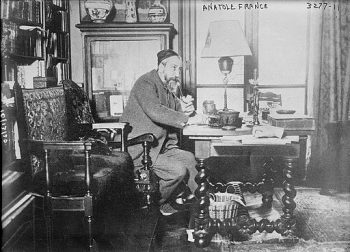French Writer – Anatole France Posted by Tim Hildreth on Oct 17, 2017 in Culture
When I’m in Paris, I love to flâner sur les quais de la Seine et faire les bouquinistes (stroll along the quais of the Seine and visit the antique book sellers/stands). During my last trip I found a little book by an author about whom I had often heard but who I had never read, Anatole France.
Anatole France (1844-1924) was a writer and journalist who chronicled life and politics in turn-of-the-century (the 19th to the 20th!) Paris. He was a member of the Académie française and even won the Nobel Prize in Literature.The book I found, Monsieur Bergeret à Paris (Mr. Bergeret in Paris), published in 1901 and part of a larger series, L’histoire contemporaine (Contemporary history), features as a central theme the conflicts between the supporters of Alfred Dreyfus and those against him. It is a complicated but fascinating work about one of the major events that shaped France (the country). And judging from his writing, France (the writer) was a man ahead of his time. From politics to existential questions, he spoke in a voice that would not be widely embraced until years later.
| Tous les progrès sont incertains et lents, et suivis le plus souvent de mouvements rétrogrades. | All progress is slow and uncertain*, and followed most often by reactionary movements. |
| Et enfin, puisqu’il y a eu des crimes, le mal n’est point qu’ils soient connus, le mal est qu’ils aient été commis.** | And finally, since crimes have been committed, the evil is not that they be known, the evil is (in) that they have been committed. |
| D’abord il n’y a pas de gouvernements populaires. Gouverner, c’est mécontenter. | First of all, no government is popular [lit. there are no popular governments]. To govern, is to upset/disappoint. |
| Nous-même, nous embrassons d’un seul regard, en levant les yeux au ciel, des aspects qui ne sont point contemporains. Les lueurs des étoiles, qui se confondent dans nos yeux, y mélangent en moins d’une seconde des siècles et de milliers de siècles. | Even us, with one look, our eyes raised to the sky, we take in events that are not contemporaneous. The glimmer of the stars, which get mixed up in our eyes, blend in less than one second centuries and thousands of centuries. |
| Le temps n’existe point en réalité et la succession des fait n’est qu’une apparence, tous les faits sont réalisés ensemble et notre avenir ne s’accomplit pas. Il est accompli. Nous le découvrons seulement. | Time doesn’t exist in reality. The succession of events is only an appearance. Everything is really happening at the same time and our future is not something that we accomplish. It is already accomplished. We simply discover it. |
* In English it is more natural to say “slow and uncertain” than “uncertain and slow” as in the French.
** This is an example of the dreaded subjunctive case . . . which really isn’t all that bad if you know a few simple rules.

Build vocabulary, practice pronunciation, and more with Transparent Language Online. Available anytime, anywhere, on any device.




